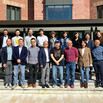Su Lin Han Convenes Workshop Wrapping Up Pilot Project on Employment Discrimination
Su Lin Han Convenes Workshop Wrapping Up Pilot Project on Employment Discrimination
Employment discrimination in China is widespread. Despite enactment of laws and regulations by the government to curb discrimination, enforcement problems persist: Courts have been unwilling to provide sufficient judicial remedies to victims of employment discrimination and existing administrative mechanisms to enforce labor rights and resolve disputes have generally excluded discrimination claims. Our Center has provided research assistance to our partner Li Ying, a well-respected Chinese gender law expert, and her NGO on a pilot project in Xinle, Hebei Province which established and implemented an EEOC-like agency specialized in handling employment discrimination claims and combating discriminatory employment practices in the workplace.
The pilot was successfully concluded in March. Our Senior Fellow Su Lin Han participated in the project’s wrap-up workshop on February 28 in Hebei’s provincial capital, Shijiazhuang. The purpose of the workshop was to report and review the groundbreaking work by our project partner in cooperation with the Xinle local government, including, e.g., establishing China’s first Equal Employment Promotion Commission (EEPC); building awareness and capacity in EEPC and other local government agencies through intensive training by domestic and international experts, including experts from the U.S. EEOC and the Hong Kong Equal Opportunities Commission; laying the groundwork for EEPC to develop and operate its complaint handling mechanism; and engaging in sustained education and outreach to local workers, job seekers and employers. This work has received national media coverage and attracted the attention of Central government agencies and institutions which recognize the value of EEPC as an effective model for employment promotion and for resolving employment discrimination disputes in China.
Despite the project’s initial success, many difficult legal and institutional challenges remain, including in particular EEPC’s lack of clear enforcement authority to investigate claims or to take remedial actions against employers. Within its existing legal mandates from the Xinle local government, EEPC must explore more creative and innovative ways to enhance EEPC’s enforcement authority in order to overcome this major hurdle in administrative enforcement of employment discrimination claims.
The workshop was attended by 60 participants, including Li Ying and other prominent Chinese discrimination law experts who contributed to our project work, EEPC and other Xinle government officials, representatives of the Hebei Women’s Federation and provincial labor officials, representatives of the Ministry of Human Resources and Social Security and the All China Women’s Federation, public interests groups representing women and persons with disabilities, and employer and business representatives.


